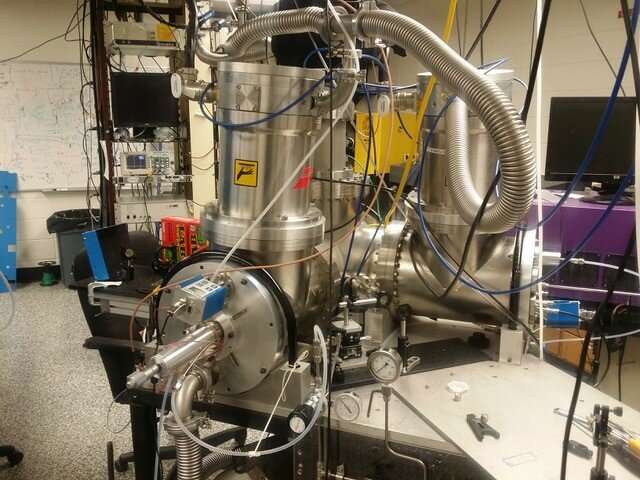Researchers discover molecules 'spin flip' from magnetic to non-magnetic forms dynamically

An unexpected discovery in Professor Arthur Suits' chemistry lab could have implications for manufacturing more efficient solar cells and improving photodynamic therapies for treating cancer, and it may contribute to research into quantum computing. At the heart of the discovery is the spin of electrons. Molecules are either nonmagnetic or magnetic depending on whether two electrons are paired with opposite spins or unpaired with same spins. Molecules can switch from magnetic to nonmagnetic forms or vice versa in a process called flipping a spin, but Suits says that process is inefficient and happens slowly.
"It is well known that if a nonmagnetic molecule absorbs light, often it makes a switch to the magnetic form, and that form will live for a long time and slowly give off light," he says. "It's also known that in a chemical reaction, you can start with magnetic forms, and when they react they become nonmagnetic. But it is an inefficient process that does not happen easily, and generally happens rarely in chemical reactions."
What Suits and his team found is that spin flips between magnetic and nonmagnetic forms can happen very efficiently in the course of a chemical reaction as the products separate after reaction if they are two "radicals"—molecules with at least one unpaired electron each.
Theory versus Experiment
"To show this, we conducted a scattering experiment in which two molecular beams of reactants, one atomic oxygen and the other alkylamines, are crossed inside a vacuum chamber to form products detected with a laser," Suits says. "When these come together, they form an intermediate molecule that lives a long time before it comes apart. The theory says if it remains in the starting magnetic form, it cannot live for a long time. The result shows it changes to nonmagnetic during the reaction."
To resolve the issue, Suits and his colleagues, postdoctoral fellow Hongwei Li and doctoral student Alexander Kamasah, collaborated with a colleague at Temple University, Spiridoula Matsika, a professor of computational theory, who performed sophisticated calculations to look at the likelihood of transitions from magnetic to nonmagnetic forms. They discovered that spin flips in this reaction occur much faster than expected—in just one half of a picosecond, or one half of one trillionth of a second. The surprising aspect is that this happens after the reaction is over, while the products are lingering together.
"Researchers will now know that once these big molecules start to dissociate, one possible outcome is that they can change from magnetic to nonmagnetic forms," Suits says. "Everybody thinks this is a slow process, but we show it's not always a slow process, and as a result it can happen during a transient chemical reaction."
Suits and his team say understanding this behavior is fundamental to fields from chemical physics to chemical biology, with applications in material science, molecular photonics, photosensitizers, and photodynamic therapy for cancer.
Funding for the research was provided by the U.S. Department of Energy, the Army Research Office, and the National Science Foundation. The study, "Intersystem Crossing in the Exit Channel" was published in Nature Chemistry.
More information: Hongwei Li et al, Intersystem crossing in the exit channel, Nature Chemistry (2018). DOI: 10.1038/s41557-018-0186-5
Journal information: Nature Chemistry
Provided by University of Missouri-Columbia





















